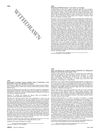 36 citations,
June 2018 in “Journal of Dermatology”
36 citations,
June 2018 in “Journal of Dermatology” Use finasteride, dutasteride, and minoxidil for hair loss treatment.
 41 citations,
December 2017 in “Lasers in Medical Science”
41 citations,
December 2017 in “Lasers in Medical Science” Low-Level Laser Therapy (LLLT) is a safe and effective treatment for common hair loss, but more research is needed to find the best power and wavelength for treatment.
[object Object]  12 citations,
January 2015 in “Indian Journal of Dermatology, Venereology and Leprology”
12 citations,
January 2015 in “Indian Journal of Dermatology, Venereology and Leprology” Negative expectations can cause adverse effects in dermatology treatments, like with finasteride for baldness, and careful communication can help reduce these nocebo responses.
 January 2022 in “Journal of Healthcare Sciences”
January 2022 in “Journal of Healthcare Sciences” Male Androgenetic Alopecia, a common hair loss in men, can be slowed and partially restored with treatments like minoxidil and finasteride, or hair transplantation. Serenoa repens may be an alternative treatment. More research is needed for new treatments.
 74 citations,
April 2005 in “Dermatologic Clinics”
74 citations,
April 2005 in “Dermatologic Clinics” Minoxidil and finasteride are effective for male hair loss, minoxidil for female hair loss, and various treatments like corticosteroids work for alopecia areata; treatment should be tailored to the individual.
 40 citations,
May 1999 in “Journal of The European Academy of Dermatology and Venereology”
40 citations,
May 1999 in “Journal of The European Academy of Dermatology and Venereology” Treat hair loss with finasteride, minoxidil, or surgery; consider side effects and severity.
 32 citations,
March 2020 in “Drug Design Development and Therapy”
32 citations,
March 2020 in “Drug Design Development and Therapy” Finasteride shows promise for female hair loss, but more research needed.
 15 citations,
May 2004 in “Facial Plastic Surgery Clinics of North America”
15 citations,
May 2004 in “Facial Plastic Surgery Clinics of North America” Treat pattern hair loss with finasteride and topical minoxidil.
11 citations,
January 2018 in “International Journal of Trichology” The true incidence of post-Finasteride syndrome is unclear, and more research is needed.
 2 citations,
May 2019 in “PubMed”
2 citations,
May 2019 in “PubMed” Oral finasteride and dutasteride may negatively affect erectile function in rats.

Combined oral minoxidil and finasteride significantly improve hair density in men with male pattern baldness.
 April 2016 in “Journal of The American Academy of Dermatology”
April 2016 in “Journal of The American Academy of Dermatology” Dutasteride works better than finasteride for hair growth with similar side effects.
 223 citations,
December 2010 in “The Journal of Sexual Medicine”
223 citations,
December 2010 in “The Journal of Sexual Medicine” Some patients taking finasteride or dutasteride may have ongoing sexual problems and depression even after stopping the medication.
 203 citations,
December 2004 in “Journal of The American Academy of Dermatology”
203 citations,
December 2004 in “Journal of The American Academy of Dermatology” Early diagnosis and treatment, using finasteride, minoxidil, or hair transplantation, improves hair loss outcomes.
 36 citations,
June 2014 in “PLOS ONE”
36 citations,
June 2014 in “PLOS ONE” Finasteride, a hair loss drug, may cause long-term sexual side effects due to changes in hormone receptor levels.
 30 citations,
January 2000 in “Dermatologic Clinics”
30 citations,
January 2000 in “Dermatologic Clinics” Finasteride and minoxidil are effective FDA-approved treatments for androgenetic alopecia.
 29 citations,
December 1998 in “Seminars in Cutaneous Medicine and Surgery”
29 citations,
December 1998 in “Seminars in Cutaneous Medicine and Surgery” New treatments for hair loss show promise, especially finasteride for men and a stronger minoxidil formula.
 10 citations,
October 2018 in “Sexual medicine reviews”
10 citations,
October 2018 in “Sexual medicine reviews” Men using hair loss drugs like finasteride may experience sexual side effects like erectile dysfunction, but it's unclear who will be affected and when. Treating depression and sexual symptoms is suggested, as these men often have higher rates of both. More research is needed to understand why these side effects occur.
 3 citations,
November 1999 in “Journal of Cutaneous Medicine and Surgery”
3 citations,
November 1999 in “Journal of Cutaneous Medicine and Surgery” AGA is a genetic, hormonal hair loss treated with finasteride, minoxidil, and supplements, but new compounds are being developed.
1 citations,
January 2020 in “Bioscience Reports” Long-term use of finasteride in women can cause hormonal changes, DNA damage, and menstrual issues.
 April 2024 in “JCEM case reports”
April 2024 in “JCEM case reports” A man's breast enlargement from low-dose finasteride for hair loss didn't go away, even with treatment, and might be more common than reported.
[object Object]  January 2024 in “Journal of lipid research”
January 2024 in “Journal of lipid research” Finasteride may lower cholesterol and slow heart disease progression.
 November 2023 in “Frontiers in Neuroendocrinology”
November 2023 in “Frontiers in Neuroendocrinology” Some people experience lasting sexual, psychological, and sleep problems after using finasteride or SSRI antidepressants, possibly due to similar underlying causes.
 November 2009 in “Cambridge University Press eBooks”
November 2009 in “Cambridge University Press eBooks” Minoxidil and finasteride combined can effectively treat hair loss.
14 citations,
May 2016 in “Therapeutic advances in urology” Taking tadalafil and finasteride together is safe and effective for treating urinary symptoms and erectile dysfunction in men with enlarged prostates.
 3 citations,
October 2007 in “Expert Review of Dermatology”
3 citations,
October 2007 in “Expert Review of Dermatology” Hair ages due to various factors and treatments like minoxidil and finasteride can help, but more research and better public awareness are needed.
2 citations,
March 2021 in “Reproduction” Finasteride may affect male fertility by interfering with specific sperm signaling.
January 2019 in “Indian Journal of Dermatology, Venereology and Leprology” 
Treatments for hair loss vary, but cell-based options may be the future.
 35 citations,
May 2012 in “Expert Opinion on Pharmacotherapy”
35 citations,
May 2012 in “Expert Opinion on Pharmacotherapy” The document concludes that there are various treatments for different types of alopecia, but more research is needed for evidence-based treatments.

























